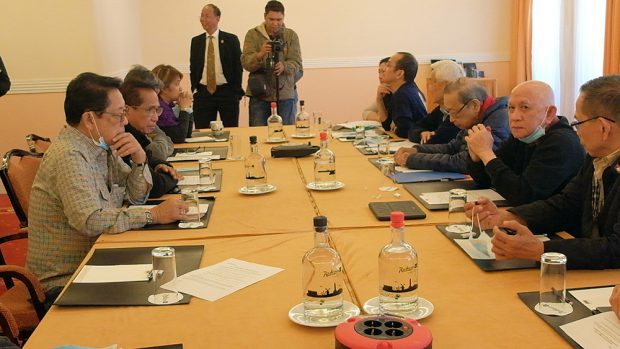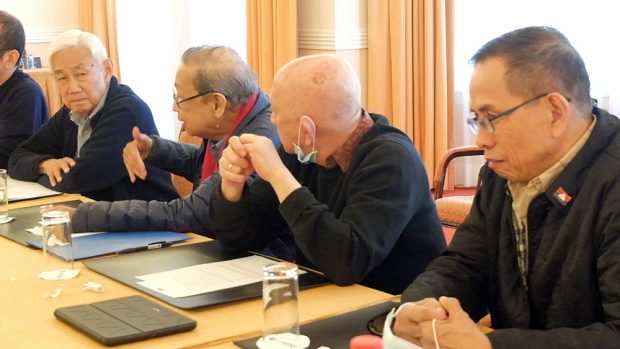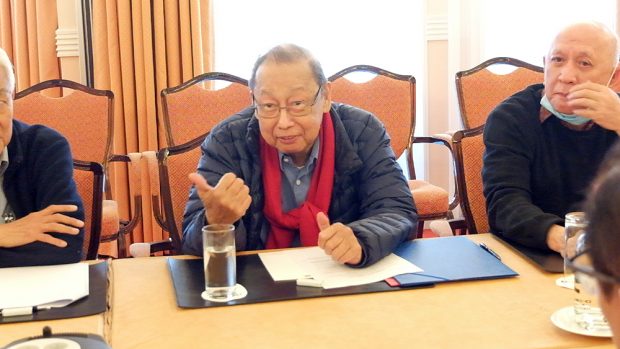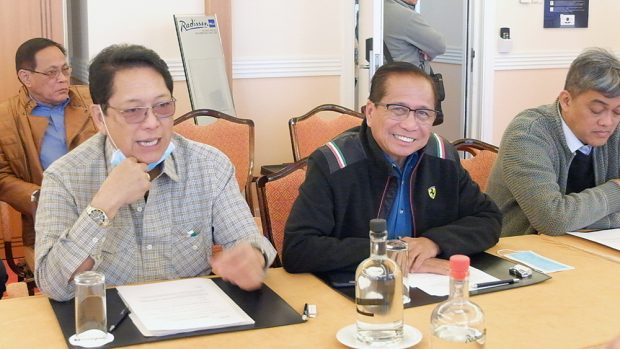2nd Day: Everyone is hoping the barong Tagalogs would be worn today
NOORDWIJK, The Netherlands— After a day’s delay, Government of the Republic of the Philippines (GRP) and National Democratic Front of the Philippines (NDFP) negotiators said they agreed to proceed with the opening ceremony of their fourth round of formal talks today. Already announced before lunch time, the agreement became final at past nine in the evening yesterday. (Three o’clock Tuesday morning, Philippine time.)
“We will wear our barong Tagalog,” GRP Presidential Adviser on the Peace Process Jesus Dureza said of the panels’ opening ceremony plans set at 10 o’clock this morning. (Four o’clock, Philippine time)
Relief among about a hundred peace consultants, advisers and staff as well as journalists covering the event greeted the announcement. It had been a decade and a half when a formal round was last cancelled after the negotiators have arrived at the venue of the talks.
“Problem-solving”
Both GRP and NDFP negotiators are being positive in describing the delays in the formal opening of the talks. Dureza said the delay is because of back-channel efforts to iron out issues before formal negotiations. “That way, everything is smoother during the formal talks,” he said. NDFP chief negotiator Fidel Agcaoili is saying the same: the parties are at a “problem-solving” stage.
They are not directly stating it, but GRP President Duterte’s new directives are probably the reasons for the delay. Just as the opening ceremony was supposed to be held yesterday morning, Duterte in Cagayan de Oro City was rattling off about his four “barest conditionalities,” including a signed bilateral agreement and for the NDFP to stop collecting revolutionary tax, claim territories and for them to release of all their prisoners of war (POWs). These were probably what he called his negotiators about yesterday. In the past, conditionalities by a party beyond what The Hague Joint Declaration stated—addressing the roots of the armed conflict and bringing about a just and lasting peace—had always been rejected by the other.
But in response to Duterte, the NDFP has already assured the GRP of flexibility and willingness in discussing the latter’s bilateral ceasefire proposal. “Because the GRP negotiating panel is coming to the Netherlands for the fourth round of formal talks, the NDFP negotiating panel is willing to be flexible and is open to discussing with its counterpart what kind of bilateral ceasefire agreement is desired by the GRP in place of the unilateral ceasefire,” NDFP panel Chairperson Fidel Agcaoili said in a statement last March 31. “The NDFP is one with the GRP in desiring to resolve the serious concerns that have been raised in relation to the previous six-month unilateral ceasefires, mindful that addressing these issues is crucial to ensuring that any ceasefire agreement in the future would be more effective,” he added. Obviously, the NDFP wanted the ceasefire proposal to be discussed in formal negotiations.
The NDFP has also repeatedly asked the GRP to suspend military and police operations to allow the safe release of more POWs. The requests are unheeded and the New People’s Army (NPA) has only managed to release two of its POWs so far. Meanwhile, the AFP seems happy to continue its all-out war against the Communist guerrillas.
While the Armed Forces of the Philippines is raining bombs on the countryside, Duterte said he wants a signed bilateral ceasefire agreement before the fourth round of talks can proceed. His announcement also came after his National Security Council was convened and his Defense secretary Delfin Lorenzana called the NPA as “terrorists,” “thugs” and “extortionists.” The GRP has also decided not to reinstate its unilateral ceasefire declaration as agreed upon in their March 11 GRP-NDFP Utrecht Joint Statement, forcing the Communist Party of the Philippines to say it too would not longer declare a unilateral ceasefire due to the GRP’s refusal to reciprocate.
The difference in tone of the parties’ statements could not be more obvious. Such has caused suspensions, cancellations, collapse, abortions and declarations of indefinite recess of formal negotiations in the past.
It would not have been the first time
If the opening ceremony would not push through this morning and the fourth round of formal talks would be cancelled altogether, it would not be the first time it would happen in the history of the 31-year GRP-NDFP peace talks.
On October 14, 1994 in De Bilt, The Netherlands, the GRP rejected the common draft drawn by the “small committees” on the joint agreement on safety and immunity guarantees and unilaterally declared a collapse of the talks.
In Brussels, Belgium on June 27, 1995, the GRP refused to release the late NDFP consultant Sotero Llamas and then President Fidel Ramos suspended the formal talks.
On April 22, 1997 in The Hague, The Netherlands, GRP declared an indefinite recess of the formal talks after NDFP rejected its “two options” proposal to amend The Hague Joint Declaration.
In Oslo, Norway on June 13, 2001, the GRP suspended formal talks in protest over the killing of the notorious Rodolfo Aguinaldo in Tuguegarao City, Cagayan.
On September 21, 2002, the GRP aborted the scheduled formal talks after the late Defense secretary Angelo Reyes convened a special meeting of the Cabinet Oversight Committee on Internal Security which reversed a Cabinet decision chaired by then President Gloria Arroyo to resume formal talks with the NDFP.
It is notable that it had always been the GRP which cancelled the talks.
Chilly Noordwijk
It had turned chilly and foggy by the time the journalists decided there would be no more stories to be had at past nine o’clock last night and started their walk back to their respective hotels. This seaside town was asleep and there were hardly locals who were out at that time. At the Radisson Blu Hotel lobby, some GRP and NDFP negotiators clustered into groups discussing what the second day of the talks would be like. The Royal Norwegian Government facilitators themselves were in a corner, probably discussing strategies for possible scenarios.
Dawn has broken here, but the sun, hidden behind a gloomy sky, has yet to make its presence felt. Rains are predicted to fall on this historic city today. But no announcement of cancellation of the opening ceremony has come during the night and the journalists are anticipating covering yet another formal talks opening ceremony.
Everyone seems to be hoping the barong Tagalogs would be worn this morning. # (Raymund B. Villanueva)




